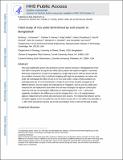Field Study of Rice Yield Diminished by Soil Arsenic in Bangladesh
Author(s)
Uddin, Anjal; Choudhury, Imtiaz; Ahmed, Kazi M.; Duxbury, John M.; Bostick, Benjamin C.; van Geen, Alexander; Huhmann, Brittany Lynn; Harvey, Charles F; ... Show more Show less
Downloadnihms909028.pdf (721.9Kb)
PUBLISHER_POLICY
Publisher Policy
Article is made available in accordance with the publisher's policy and may be subject to US copyright law. Please refer to the publisher's site for terms of use.
Terms of use
Metadata
Show full item recordAbstract
Rice was traditionally grown only during the summer (aman) monsoon in Bangladesh but more than half is now grown during the dry winter (boro) season and requires irrigation. A previous field study conducted in a small area irrigated by a single high-arsenic well has shown that the accumulation of arsenic (As) in soil from irrigating with high-As groundwater can reduce rice yield. We investigated the effect of soil As on rice yield under a range of field conditions by exchanging the top 15 cm of soil between 13 high-As and 13 low-As plots managed by 16 different farmers, and we explore the implications for mitigation. Soil As and rice yields were measured for soil replacement plots where the soil was exchanged and adjacent control plots where the soil was not exchanged. Differences in yield (ranging from +2 to -2 t/ha) were negatively correlated to the differences in soil As (ranging from -9 to +19 mg/kg) between adjacent replacement and control plots during two boro seasons. The relationship between soil As and yield suggests a boro rice yield loss over the entire country of 1.4-4.9 million tons annually, or 7-26% of the annual boro harvest, due to the accumulation of As in soil over the past 25 years.
Date issued
2017-10Department
Massachusetts Institute of Technology. Department of Civil and Environmental EngineeringJournal
Environmental Science & Technology
Publisher
American Chemical Society (ACS)
Citation
Huhmann, Brittany L. et al. “Field Study of Rice Yield Diminished by Soil Arsenic in Bangladesh.” Environmental Science & Technology 51, 20 (October 2017): 11553–11560 © 2017 American Chemical Society
Version: Author's final manuscript
ISSN
0013-936X
1520-5851